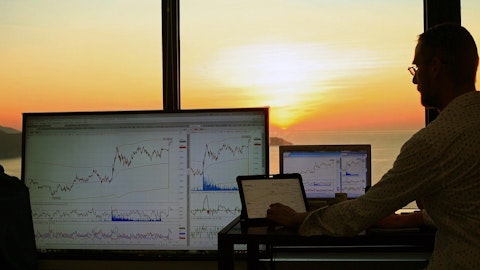When you are going up to above 13%, you can consider you are again there. So that’s the right time. Having said that, I think a philosophy for us is more to keep this balance of 70% long term, 30% spot. We have the balance sheet. We can use our balance sheet to keep part of the risk. Okay, when you keep an exposure to spot index, you take the risk like in 2020, but you take — you keep the upside like these years. So I think this is, for me, the core of the business model of a company like TotalEnergies. So strong balance sheet must allow us to take these type of risks — spot risks. But the 70-30, okay, it’s not a bible. It’s more or less we are comfortable with that in terms of management of risk in the company as we grow. So today, there are some projects on which we will lose long-term contracts.
And again, it’s like — by the way, we can also develop some project being spot, knowing that we can use this window of opportunities to then sign long-term contracts. This is what we say even to our renewable people. You want PPAs, but sometimes you could — we could accept to develop projects not with a PPA merchant projects with the idea that, tomorrow, when we have the right opportunities, we will cover part of the exposure with a long-term PPA. So that’s the beauty of the balance sheet.
Operator: The next question is from Paul Cheng of Scotiabank.
Paul Cheng: Patrick, both BP and Shell have recently made a pretty large acquisition in the biogas area to jump start their operation and also to grow in that area. Just curious that you did mention that you guys have a largest unit of the biogas in France that you just start out. You also have a venture — or joint venture that — to manage you — to developing some biogas project in the U.S. Do you think biogas would be a more important part of your low-carbon energy business going forward? And if so, do you think you need to have a larger platform maybe through an acquisition that — to accelerate the growth there? That’s the first question. The second question, first, thank you for breaking out the integrated power business starting in the first quarter.
Can you tell us that what is the return on that basis that currently that you achieved? Your peers, I think BP and Shell, seems to stop questioning the overall return on that business. And just want to see that what’s your view — or what you guys have been able to achieve so far.
Patrick Pouyanne: Biogas, honestly, M&A is a way to grow if you can deliver the value you pay. And I have difficulty to be convinced to put several billion dollars in biogas. Why? Because then, we are doing things, and we have — we bought a platform in France. We just bought a new platform. It will be announced soon in Poland. Why? Because it’s quite a local business. It’s like renewables. The way you manage — the technology is not high tech. Okay, you can do larger ones, but there is no rocket science. So then it’s becoming a question of local development. And I’m sorry to tell you, this is not because you are good in a Nordic country to develop biogas, but you can be good in France, where the agriculture organization, the agricultural ecosystem is quite different.





